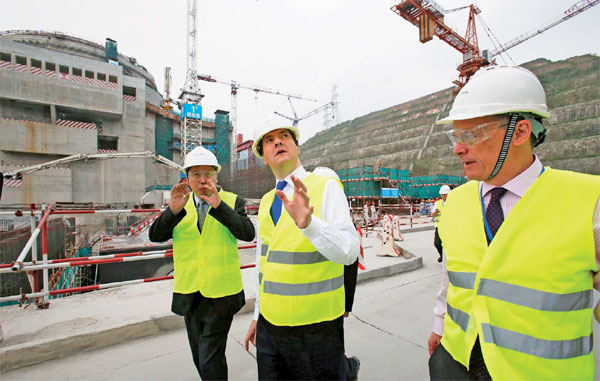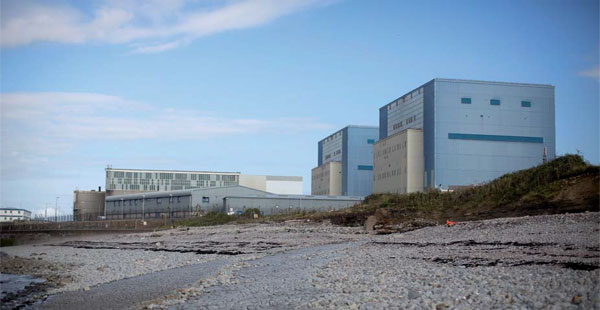Fired by nuclear ambitions
Updated: 2014-06-13 07:53
By Cecily Liu (China Daily Europe)
|
|||||||||||
|
British Chancellor of the Exchequer George Osborne visits a nuclear power plant under construction in Taishan, Guangdong province, in October 2013. Provided to China Daily |
Experience at home has equipped China's atomic energy industry with tools to go global
China's nuclear power industry is looking to gain a global reach, targeting markets which can benefit from expertise gained in creating the world's largest nuclear new build program.
The opportunity for this expansion became greater after the Fukushima disaster in 2011, which caused many Western countries like Germany, Italy and Switzerland to shelve nuclear energy plans because of safety concerns.
China's international focus began in 2005 when the National Development and Reform Commission, the country's top economic planner, suggested selling the country's nuclear expertise overseas.
The government's support for nuclear development coupled with the financial strength of its nuclear operations, put them in a good position to bid for international deals.
And Chinese nuclear companies are keen to enter is the UK, which will allow them not only to work on profitable projects but also establish a reputation so that they can embark on projects in other Western markets, experts say.
So far, two Chinese nuclear power companies have reached an agreement to invest in the UK's first nuclear power stations in two decades, a milestone move that will demonstrate the strength of the Chinese nuclear industry in Western countries.
The two planned reactors are at Hinkley Point C, in Somerset. Led by EDF Group of France, they will cost 14 billion pounds (17.4 billion euros), and are due to start operating in 2023 if built on time and will run for 35 years.
China General Nuclear Power Group and China National Nuclear Corporation are expected to have a combined 30 to 40 percent stake in the consortium, with Areva taking another 10 percent, EDF says.
Exact plans for cooperation at Hinkley Point C are expected after a European Commission decision on UK state aid for the project is made.
Cooperation between EDF and its Chinese partners on Hinkley Point C was first announced by British Chancellor George Osborne when he visited China in October.
In March, EDF signed a global partnership in the nuclear field with CGN, during the visit of Chinese President Xi Jinping to France.
EDF and CGN have also signed a protocol to foster industrial cooperation between EDF and its Chinese partners in the British nuclear market.
EDF and CNNC have also agreed to reinforce their cooperation in nuclear energy, especially regarding engineering, operations and maintenance.
Nigel Cann, Hinkley Point C construction director with EDF Energy, says its Chinese partners can bring valuable experience from the construction of nuclear projects in China, which will help the project keep on time and to budget.
A number of engineers in Cann's team worked on Daya Bay and Taishan, two nuclear projects in China, and will bring valuable knowledge to Hinkley Point C, Cann says, including know-how in pre-construction tasks.
Chinese nuclear companies can gain valuable lessons from the project about the UK's nuclear market, and gain experience working with the UK regulator, which will help them invest in UK future nuclear projects, Cann says.
"It's important to realize that Hinkley Point is a first step for Chinese partners in the UK."
Aijuan Wang, a director in Mott MacDonald's power business, says Chinese nuclear companies can learn a lot from taking part in a project like Hinkley Point C as minority investors, and this experience will help to equip them to tackle future UK nuclear projects, perhaps as majority investors.
"The nuclear industry regulations and technical standards in each country are different," she says.
Mott MacDonald has been building a long-term relationship with key Chinese players, and is helping them invest, develop, build and operate internationally, Wang says.
"We're providing technical engineering assessment, which includes licensing and permits for a project, understanding the regulatory framework and submitting applications. We also help our client gain an understanding of the supply chain, the key drivers for project scheduling and planning, as well as other environmental and engineering challenges."
Central to the licensing process is the generic design assessment, which initially takes five years to complete, she says, but subsequent assessments are then needed to make sure the nuclear plant is built and operated in compliance with the assessment requirements throughout its lifecycle.
It makes sense for Chinese companies to export their nuclear capacity because they have accumulated so much valuable knowledge from the domestic nuclear industry, Wang says.
"Over the past 30 years China has developed skills and capability in the nuclear power industry, including reactor technology R&D, design, manufacture, construction and operation."
Mott MacDonald's collaboration with Chinese nuclear companies is an example of international nuclear industry companies going into China and establishing relationships, leading to cooperation in China and elsewhere.
Another such company is Rolls-Royce, which has supplied nuclear equipment and systems to China for more than 20 years.
It established a China presence in 1986, working on the Daya Bay nuclear program and LingAo program with Framatome and EDF, supplying solutions such as neutron instrumentation systems and rod control systems.
Since then it has been supplying systems and products for more than 30 reactor units in China, and in the process has established "good and open relationships with our customers based on mutual trust", a company representative says.
"We are looking forward to working with Chinese nuclear companies in international markets, notably in the UK," says David Orr, Rolls-Royce's director of strategic program in nuclear, adding that China is important for Rolls-Royce's nuclear sector strategy.
"The Chinese nuclear industry is increasing its focus on international projects, and Rolls-Royce has a vast amount of UK regulatory experience that could be used to help support China's entry into the UK new-build market."
One reason that the UK has become an attractive destination for foreign investment is that it has not retreated from nuclear energy after the Fukushima crisis as some other Western countries have done.
"In the UK, there is no opposition to nuclear as long as safety standards are met," says Marco Baroni, a senior energy analyst in the Directorate of Global Energy Economics at the International Energy Agency.
As long as safety is guaranteed, the next big consideration for the UK's nuclear industry is cost, and here Chinese companies' cost efficiency would give them a big advantage, Boroni says.
"China can have a good competitive advantage, as it can develop nuclear at lower costs than most of the companies in developed countries, but only as long as safety is assured. So safety is central, then developing technology domestically to get the know how, the learning that is require to the get the costs down, then being able to export. But I think China will be able to do this."
Chinese companies may find it more costly to export their nuclear expertise initially because they need to invest in learning about regulatory requirements and market characteristics of the country they go to, he says.
But once Chinese companies are familiar with Western markets and begin to take on more international projects, they can benefit greatly from economies of scale, Baroni says.
"Nuclear benefits enormously by economies of scale. If you just develop one power plant, this is likely to be very costly, but the more you develop the more you learn by doing, which then will decrease the costs over time."
Despite being new entrants in the UK's nuclear energy market, Chinese nuclear companies have already won recognition and trust, based on their success in China.
Peter Haslam, head of policy at the UK's Nuclear Industry Association, says China has an impressive record in delivering nuclear programs and has ambitious programs for the future.
"We hear about the new power stations the Chinese are building, including ones with Areva design, Westinghouse design and China's indigenous designs. The reports we're getting say they are successful."
Haslam says foreign investment plays a strong role in the British nuclear industry because the country operates a competitive electricity market. Nuclear energy is an important part of the UK's electricity generation and most of the country's nuclear plants need re-commissioning, he says.
"Nowadays the energy market is increasingly international. There is nothing surprising about foreign investment. In fact new projects are so capital intensive it is hard for companies to invest alone."
But despite the obvious advantages Chinese nuclear companies seem to have in the international market, they still face negative perceptions.
Last year, Mark Pritchard, an MP who is also a member of the national security committee, was quoted by the Financial Times as saying that Chinese companies should take only a "minor" role in sensitive sectors such as energy.
Encouragingly, the UK government has dismissed doubts and fears about Chinese nuclear companies and given them a level playing field to compete against other international nuclear companies for UK projects.
Ed Davey, British energy and climate change secretary, said in a previous interview with China Daily that Britain's energy market is completely open to Chinese investors both as minority and majority investors on projects.
Pritchard's views do not represent the view of the British government, because he is a parliamentary backbencher, Davey says.
Tony Ward, UK head of power and utilities at EY, a global consultancy, says there is an international lack of confidence in Chinese nuclear technology, although there is no evidence to support this concern. This is a challenge the Chinese need to overcome by proving themselves step by step in international projects.
"There is a perception internationally that the ability to build complicated reactors in China might be a consequence of corners being cut somewhere. There is no evidence of that."
Internationally, other nuclear companies such as Areva, Hitachi and Rosatom have proven themselves over 20, 30 or 40 years, and Chinese companies should do the same, he says.
"I don't think there is a shortcut."
Philipp Neumann contributed to this story
cecily.liu@chinadaily.com.cn
|
Electricite de France SA's Hinkley Point A nuclear power station stands on the bank of the Bristol Channel near Bridgwater, UK. Provided to China Daily |
(China Daily European Weekly 06/13/2014 page12)
Today's Top News
China finds way to play in 2014 World Cup
Protocol targets sex violence
Premier all business on Europe trip
Poland-China train on maiden trip
Iraq facing 'mortal threat' from militants
China, Italy boost ties
Brazil averts strike before WCup
Red meat 'linked to cancer'
Hot Topics
Lunar probe , China growth forecasts, Emission rules get tougher, China seen through 'colored lens', International board,
Editor's Picks

|

|

|

|

|

|







